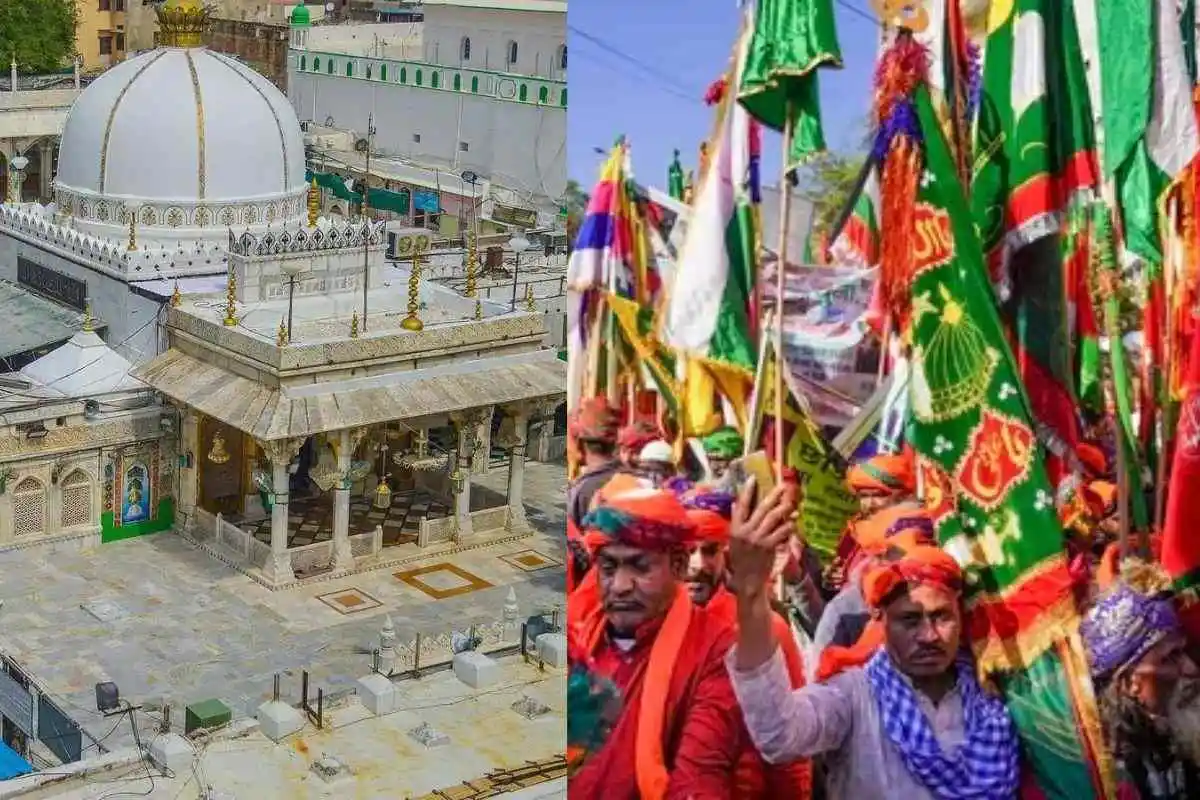


A civil suit has been filed by Hindu Sena President Vishnu Gupta, claiming that the famous Ajmer Dargah in Rajasthan was built on top of a Shiva temple. The court has issued notices to the ASI, Union Ministry of Minority Affairs, and the Ajmer Dargah Committee to conduct a survey and reconstruct the temple at the site. The plaintiff argues that the Dargah was built on the site of old Hindu temples, and the religious rights of Hindus are being infringed.
Contested History: Hindu Sena Files Suit to Reconstruct Shiva Temple at Ajmer Dargah
Background
The Ajmer Dargah, a revered Sufi shrine in Rajasthan, has become the latest battleground in India's ongoing debate over historical sites. The Hindu Sena, a right-wing organization, has filed a civil suit claiming that the Dargah was built on top of a Shiva temple and that its reconstruction is necessary to restore Hindu rights.
The Lawsuit
In its plea, the Hindu Sena asserts that the Ajmer Dargah was forcibly converted from a Hindu temple during the 12th century. The suit seeks a survey of the site by the Archaeological Survey of India (ASI) and the reconstruction of the Shiva temple. Notices have been issued to the ASI, Union Ministry of Minority Affairs, and the Ajmer Dargah Committee.
Controversy and Reactions
The lawsuit has sparked controversy, with both Hindu and Muslim groups weighing in. Hindu Sena President Vishnu Gupta claims that the Dargah holds religious significance for Hindus and that its reconstruction will rectify a historical injustice. Muslim organizations have condemned the suit as an attempt to inflame communal tensions and undermine the sanctity of the Dargah.
Top 5 FAQs
1. What is the basis for the Hindu Sena's claim? The Hindu Sena alleges that the Ajmer Dargah was built on the site of a Shiva temple mentioned in ancient texts.
2. What evidence supports the claim? The Hindu Sena has not presented any concrete evidence to support its claim that the Dargah was built on a Hindu temple.
3. What is the legal basis for the lawsuit? The Hindu Sena is citing the Places of Worship Act, 1991, which prohibits the conversion of religious places from one faith to another.
4. What is the potential impact of the lawsuit? If successful, the lawsuit could lead to the reconstruction of a Shiva temple at the site of the Ajmer Dargah, potentially creating religious tensions between Hindus and Muslims.
5. What is the historical context of the Ajmer Dargah? The Dargah was built in the 12th century on the tomb of Sufi saint Moinuddin Chishti. It has been a popular pilgrimage site for both Hindus and Muslims for centuries.

The Kasibugga Venkateswara Temple in Srikakulam district was the site of a heart-wrenching stampede, causing multiple fatalities and affecting the community deeply. Chief Minister N. Chandrababu Naidu has expressed his sorrow over the unfortunate incident, as well as directing officials to ensure that those injured receive the best medical treatment possible. As local officials and public representatives are called to oversee relief operations, swift action is required to aid those affected and manage the situation effectively.

Indian Prime Minister Narendra Modi inaugurated the Shanti Shikhar Academy for Peaceful World in Raipur, praising the Brahma Kumaris organization for bridging India's ancient wisdom with the world's search for harmony. He credited the group's selfless service and spiritual discipline for their efforts towards universal peace. He positioned the Brahma Kumaris as protectors of India's soul and highlighted India's proactive role in addressing global crises such as disaster relief and environmental threats.

In an act of solidarity and protest, millions of Muslims in India used their Friday prayers to denounce the recent killings that took place in Pahalgam. The news comes amid growing tensions between the Muslim community and the Indian government. Many are viewing this as a sign of unity and determination from the Muslim population in India.

The state of Karnataka, or Kannada Rajyotsava, marked its 69th anniversary with a grand ceremony organized by the district administration in Mangaluru. District in-charge minister Dinesh Gundu Rao paid tribute to the leaders and writers who fought for a unified Kannada state and presented awards to 80 outstanding individuals and organizations. In his address, the minister highlighted the rich cultural and historical heritage of Karnataka and called for a sense of pride among its citizens.

Telangana's 'Run for Unity' event marked the 150th birth anniversary of Sardar Vallabhbhai Patel, India's first Deputy Prime Minister and architect of national integration. The event, carrying the message of "Ek Bharat - Shreshth Bharat", honored Patel's legacy of unity, sacrifice, and nation-building. Telangana BJP President N Ramachander Rao paid tribute to Patel and highlighted his pivotal role in integrating princely states, including Hyderabad, into the Indian Union. He also commended Prime Minister Narendra Modi and Home Minister Amit Shah for upholding Patel's ideals of national integrity.

The FBI has successfully stopped a potential terrorist attack in Michigan on Halloween weekend, according to FBI Director Kash Patel. Multiple suspects have been arrested after allegedly planning a violent attack that was connected to international terrorism. The suspects, whose ages range from 16 to 20, had engaged in firearms training and mentioned "pumpkin day" as a code for Halloween. White House Senior Director for Counterterrorism Seb Gorka confirmed the thwarted attack and stated that it was intended to occur during a time when children should be enjoying themselves.

Amidst criticism over his comments on his interfaith marriage to his Hindu wife, Usha, US Vice President JD Vance reiterates the importance of mutual respect, trust, and communication in their union. While he hopes she may someday embrace his Christian faith, her decision to maintain her beliefs is respected. Despite their differences, the couple has agreed to raise their children in the Christian faith, with Usha supporting them. At a Turning Point USA event, Vance also reaffirmed the couple's balanced approach towards managing their interfaith household.

Three days after TVK leader Vijay met with the family members of the victims of the Karur tragedy, Central Bureau of Investigation (CBI) team led by Superintendent of Police Praveen Kumar visited the rally site in Velusamypuram where the deadly stampede occurred. The officers conducted inquiries with locals and studied the topography of the area, as well as Vijay's travel route. The transfer of the case to the CBI and the re-registration of the FIR remains a secret and its contents have not been made public yet.

Prime Minister Narendra Modi praised the demonstrations by the indigenous dog squad as one of the most admired parts of the Rashtriya Ekta Diwas parade at the Statue of Unity. The squad included breeds like Rampur Hounds and Mudhol Hounds, with Mudhol Hound "Riya" leading the pack. PM Modi also applauded the Assam Police's Motorcycle Daredevil Show and the cultural performances at the parade, which reflected the theme of "Unity in Diversity." The event was attended by five Shaurya Chakra awardees and 16 gallantry medal winners from the CRPF and BSF.

The FBI has announced the arrest of multiple individuals in Michigan who were planning a violent attack over the Halloween weekend. Director Kash Patel praised the vigilance of law enforcement personnel and assured the public that there was no threat to the community. These arrests come after a previous arrest in May of a Michigan man who allegedly planned an attack on a US Army facility on behalf of the Islamic State group. The suspect remains in federal custody and is expected to plead guilty.